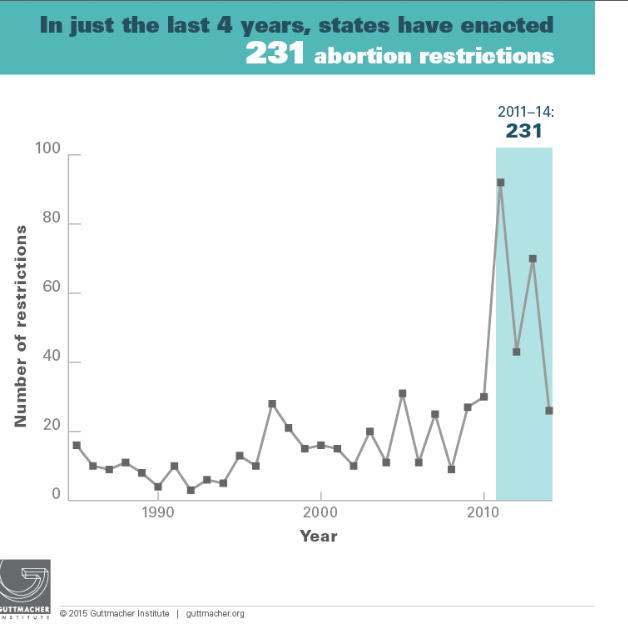With dangerous proposals like House Bill 1948, Pennsylvania politicians are once again inserting themselves in the most private and personal medical decisions best left between a woman and her doctor.
This bill would ban abortion at 20 weeks and ban one of the most common types of abortion procedures. Almost 99% of abortions take place before 21 weeks, but when a woman seeks a later abortion it’s often n very complex circumstances. Yet anti-abortion access legislators in Harrisburg want to make this private and personal medical decision for women & families in Pennsylvania by passing HB 1948.
It took this same legislature over 280 days to pass the 2015-2016 budget, yet it only took THREE DAYS to introduce (April 1) and send (April 4) this bill to the full House for a floor vote. The debate and final vote in the PA House of Representatives is expected as early as Tuesday, April 12.
The Hypocrisy? 3 days to make war on women’s bodies. 9+ months to pass state budget funding critical government safety programs, education, and the general running of state and local services!

The Hypocrisy of the PA Legislature
What’s wrong with this picture? If it were to become law, HB 1948 would create one of the most restrictive, harmful, and unconstitutional abortion bans in the United States. It would change the states abortion ban from 24 weeks (that’s the edge of viability) to 20 weeks.
It would also outlaw the safest form of 2nd trimester abortion procedure known as dilation and evacuation, according to the American Congress of Obstetricians and Gynecologists (ACOG). According to a statement released by ACOG, “these restrictions represent legislative interference at its worst: doctors will be forced, by ill-advised, unscientifically motivated policy, to provide lesser care to patients.”
Although relatively rare, 2nd trimester abortions done in a safe and timely manner are necessary. Here’s one woman’s story. As Julie says in this video, “This has nothing to do with politics. This has to do with the choices my husband and I needed to make.”
And here’s another story. This one is from Evelyn, who says, “It was the hardest decision I’ve ever had to make. Whether or not to have an abortion is a decision that should always be made between a woman, her family, her doctor, and her god.”
As you can see from these two women who were willing to come forward with their personal stories, it’s clear that lawmakers should not interfere with personal medical decisions. A woman considering an abortion is already facing challenging circumstances. We’re not in her shoes. We should not deny her the ability to make a decision in consultation with those she trusts. And no matter how we feel about abortion, we can all agree that a woman’s health, not politics, should drive important medical decisions. Lawmakers are not medical experts and this is not an area where lawmakers should be intruding.
HB 1948 also places women at risk by ignoring individual circumstances and health needs. Her health and safety is paramount. Providers and their patients may determine later abortion care is the best medical option for a variety of reasons. HB 1948 would take the decision out of the hands of patients and their trusted medical care providers and put it in the hands of politicians. This would endanger women and jeopardize safe, legal abortion care.
These types of attacks are aimed at criminalizing abortion and attack women’s constitutional rights. 20-week bans are unconstitutional and a clear attempt to erode Roe v. Wade at the expense of women’s health. In fact, 20-week ban proponents are outspoken about their goal to challenge the 1973 Supreme Court decision protecting a woman’s right to safe and legal abortion. Eliminating access to safe, constitutional and legal abortion services is a war on women from legislators attempting to impose their morality and narrow view of religious
The Supreme Court’s ruling in Roe v. Wade also recognized that different moral and religious traditions have differing views on abortion. Protecting a woman’s ability to make her own decision about ending a pregnancy is critical to respecting her religious freedom. It is unjust for lawmakers to privilege the views of those who oppose abortion and seek to impose those beliefs on everyone, as doing so would directly block a woman’s ability to make her own faith-informed decision on this personal matter.
Bottom Line: While a majority of abortions in the United States occur in the first trimester, it is important that a woman, her family, and her doctor have every medical option available whenever she needs it. Laws banning later abortion would take that deeply personal decision away.
If you are part of the majority of voters who opposes these bans, contact your legislator today and urge them to oppose HB 1948.


















